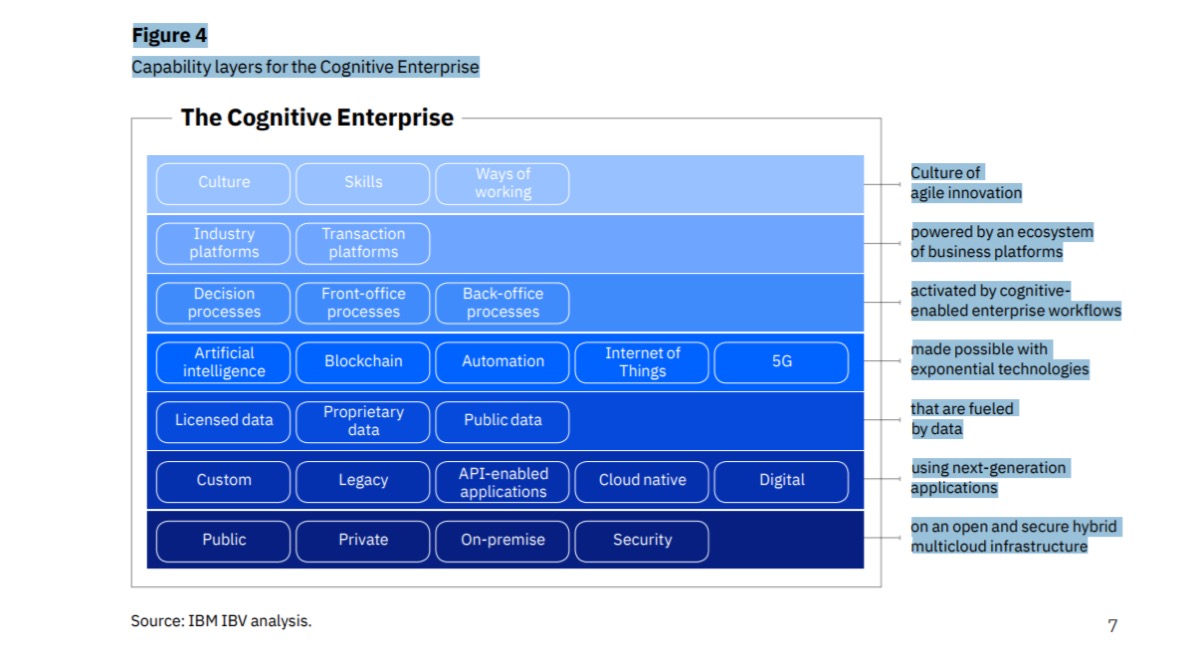think Summit
AI and the Cognitive Enterprise Usher in the Next Era of Digital Transformation
June 25, 2019 | Written by: 小編 / Editor
Categorized: AI | Data | Digital Transformation | Hybrid Cloud | think Summit
Share this post:

The IBM Think Summit 2019 highlighted how Hong Kong business and industry is primed for transformation through co-creation and co-innovation
Digital transformation is an ever-present challenge that is now entering a new era. The coming of what many call the 4th industrial revolution is driving businesses into the era of intelligence. Driven by the unprecedented convergence of technological, social and regulatory forces, technologies like artificial intelligence (AI), automation, Internet of Things (IoT), blockchain and 5G will soon mature and reshape modern businesses.
“These technologies are changing so fast and bringing such different challenges that we are already seeing today how they are affecting businesses and our lives, said Francis Ngai, General Manager for IBM Hong Kong, at the opening of the IBM Think Summit 2019. The summit gathered business and technology leaders to explore ways to drive smarter business for a smarter Hong Kong.

Francis Ngai, General Manager, IBM Hong Kong
Alain Benichou, President of IBM Greater China Group also noted that a new era of business reinvention is coming with co-creation and co-innovation as central themes for the way businesses will operate in the future. This sense of co-creation and co-innovation was echoed by Albert Wong, CEO of Hong Kong Science & Technology Parks Corporation. Wong cast everyone’s attention to the past glory days of Hong Kong as a mighty little dragon of Asia with its surging development fueled by manufacturing prowess and entrepreneurial spirit.

Alain Benichou, President, IBM Greater China Group
Wong noted that Hong Kong used to be known for its low-tech that supported industries like manufacturing. But today, Hong Kong features huge innovation potential that is waiting to be unlocked to enable it to become a leader in high tech. The Science Park is working with partners like IBM and others in creating exactly the required eco-systems to enable enterprises, startups and technology companies to thrive in a co-creation and co-innovation environment.

Albert Wong, CEO, Hong Kong Science Parks Corporation
Continuing in this theme of a new era of transformation, Chun Yin Mak, Managing Partner and General Manager of Global Business Services from IBM Greater China, introduced the concept of the ‘Cognitive Enterprise’ that provides a roadmap to creating an agile dynamic and intelligent business. He noted that when people think of industry transformation and disruption, they often cite the emergence of the Internet companies as the leaders of disruption and the companies that will dominate industry. However, a recent study by IBM indicted that 72% of senior executives believe that industry incumbents who are courageous, can truly grasp innovation opportunities and embrace a culture of change will also succeed in disrupting and lead their industry sector. “We’re calling this idea: industry incumbents strike back!” said Chun.

Chun Yin Mak, Managing Partner and General Manager, Global Business Services, IBM Greater China Group
But how will these companies grasp this opportunity? Chun and IBM believe that the companies that will succeed in this future will adopt the concept of the cognitive enterprise. He described the cognitive enterprise in the way a human works. AI being a key part of the brain that is connected to the five senses as well as the arms and legs of the human body. The business is then being powered by these new technologies enable it to be much more responsive through improved use of data, information, dynamic automated processes and use of talent that enable much better ways of reacting and serving customers, employees and partners.
“The cognitive enterprise will define how companies will behave, change, react and take action,” said Chun. A critical difference in this next stage of digital transformation is the need to move from the “outside-in” digital transformation of the past decade to the “inside-out” transformation that exploits the huge potential of a company’s data the emergence of exponential technologies like AI, blockchain and IoT. “This starts with an agile culture to form the seven layers of the cognitive enterprise,” said Chun.
THE SEVEN CAPABILITY LAYERS
Chun added that another key difference in this shift to a cognitive enterprise is the deep integration of the seven layers. “This intense focus on business platforms, data, workflows, processes, talent and people to deliver what is truly distinctive in you market is what is truly different to past iterations of digital transformation,” he noted.

Two IBM clients and collaborators shared their own transformation experiences that are indicative of this cognitive enterprise concept. Andy Bien, Chief Information Officer, Airport Authority Hong Kong, described how his organization is in the process of building a smart airport fueled by technologies like IoT, big data and AI. It also leveraging a co-innovation model of partnerships with companies like IBM but also startups to drive innovation.
At Ocean Park there a revolution occurring behind the scenes where the whole customer journey is being mapped out and analyzed to find better ways to serve its customers. “We are redefining the customer journey, but this goes beyond the park experience—it starts with customer considerations when planning their trip whether they are from overseas, China or local,” said Henry Chan, Head of Innovation & Information Technology at Ocean Park Hong Kong. This consideration of the whole journey shifts the focus of Ocean Park away from just its product but to the whole extended eco-system that could engage its customers at any point in that journey.
Shifting back the internal aspects of this transformation, Bien observed how his organization and others will have to adapt to a world where co-workers can no longer be assumed to be the group of human colleagues working beside you but must also include robots, machines and technology. “We have introduced robotic process automation tools that we plan to insert as staff into our organization,” said Bien. “They don’t yet have names, but one may be called Andy!”

But the key point is that technology and AI should no longer be seen as just tools or systems in the background but as integrated parts of the team. “How we and other organizations manage this shift will be key to enabling staff to do better jobs and be more effective and fulfilled in their roles,” Bien added.
AI and automation can truly make jobs easier and free people to focus on the critical aspects of their role. Chan at Ocean Park highlighted a focus at the park is to create platforms of value for his employees. “We are leveraging data to create new resources that allow staff to easily analyze customer preferences and make them readily available to staff and customers to help them plan their journey and park experience,” said Chan
It is examples like these that highlight the potential of businesses in Hong Kong and around the world in effectively shifting to this new era of intelligence and in adopting the cognitive enterprise model.
Chun emphasized this focus on platforms of value. “If you are not creating these platforms of value [for employees or for your customers] then they will go to other places to find value.” Only by combining the different elements of the cognitive enterprise and tying them together to build new capabilities will deliver effective transformation,” he said.
Contact our colleague if you need more information and are keen to learn how to start the chapter 2 of digital reinvention.
IBM專家觀點:從ChatGPT走紅,談企業需要甚麼樣的人工智能 —— 從「百事通」到「業務助手」
ChatGPT火爆出圈 最近幾週,AI業界最大的新聞無疑是ChatGPT橫空出世,從而引發的業界震動。 市場上有大量的評論文章,有把它描述成無所不能的,大有代替人類職業之勢; 也有提出擔憂,某些頂級學術雜誌和知名高校已經明確限制AI作者發表論文和科研成果。
ASL Optimizes Application Performance with IBM AIOps Solution
Organizations are now accelerating their digital transformation, therefore transforming the application landscape and making it more hybrid and complex. However, Hong Kong has seen a shortage of tech talent in recent years, presenting several key challenges to organizations when managing their applications. The talent shortage is an urgent concern that is currently slowing […]
Why the Future of Financial Services Lie in Extreme Digitization
Three years into a global COVID-19 pandemic and financial services firms are beginning to face a different market landscape. The biggest change is customer expectations. After shifting to a more digital lifestyle, retail and business customers want the same level of seamless experience that fintechs, virtual banks, platform players, and SaaS applications offer. It’s […]

